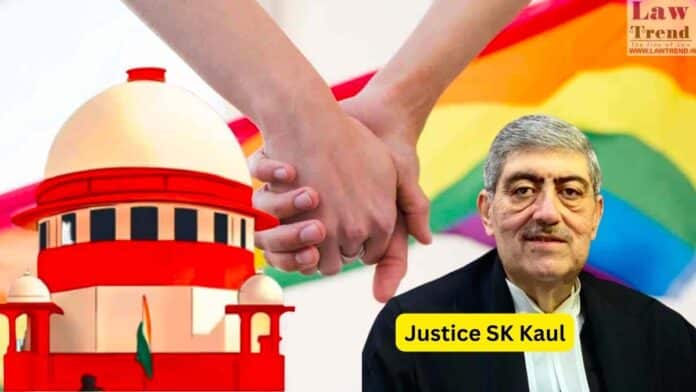Non-heterosexual unions and heterosexual marriages ought to be considered as two sides of the same coin, both in terms of recognition and consequential benefits, Supreme Court judge Justice Sanjay Kishan Kaul said as he lamented that the only deficiency at present is the absence of a suitable regulatory framework for such unions.
Justice Kaul, who broadly agreed with the judgement of Chief Justice of India DY Chandrachud, in his separate verdict said a pluralistic social fabric has been an integral part of Indian culture and the cornerstone of the country’s constitutional democracy.
“Non-heterosexual unions and heterosexual unions/marriages ought to be considered as two sides of the same coin, both in terms of recognition and consequential benefits. The only deficiency at present is the absence of a suitable regulatory framework for such unions,” Justice Kaul, who was part of the five-judge bench comprising the chief justice, Justices S Ravindra Bhat, Hima Kohli and PS Narasimha, said.
Non-heterosexual unions are entitled to protection under our constitutional scheme, he stressed and held that the Special Marriage Act (SMA) is violative of Article 14 (right to equality) of the Constitution as it creates two distinct and intelligible classes heterosexual partners who are eligible to marry and non-heterosexual partners who are not.
Rejecting the submission of the Centre and those opposing legal recognition to same-sex marriage doubting the social acceptability of non-heterosexual relationships, Justice Kaul said, “It is no longer res integra (untouched matter) that the duty of a constitutional Court is to uphold the rights enshrined in the Constitution and to not be swayed by majoritarian tendencies or popular perceptions. This Court has always been guided by constitutional morality and not by social morality.”
He said non-heterosexual unions are well-known to ancient Indian civilisation as attested by various texts, practices, and depictions of art and these markers of discourse reflect that such unions are an inevitable presence across human experience.
The significant aspect is that same-sex unions were recognised in antiquity, not simply as unions that facilitate sexual activity, but as relationships that foster love, emotional support, and mutual care, he said.
“Marriage as an institution developed historically and served various social functions. It was only later in its long history that it came to be legally recognized and codified. However, these laws regulated only one type of socio-historical union, i.e., the heterosexual union,” he said, adding it would be misconceived to claim that non-heterosexual unions are only a facet of the modern social milieu.
Agreeing with the views of CJI Chandrachud that the right to form unions is a feature of Articles 19 and 21 of the Constitution, Justice Kaul said therefore, the principle of equality enumerated under Articles 14 and 15 demands that this right be available to all, regardless of sexual orientation and gender.
Also Read
Holding that the SMA is violative of Article 14, Justice Kaul said that section 4 of the Act contemplates a marriage between a male who has completed the age of 21 years and a female at the age of 18 years.
Disagreeing with the views of Justice Bhat on the intention of the SMA to enable marriage of heterosexual couples exclusively, Justice Kaul said according to him, the stated objective of the SMA was not to regulate marriages on the basis of sexual orientation.
Justice Kaul said an objective to exclude non-heterosexual relationships would be unconstitutional, especially after the apex court in its 2018 verdict decriminalised gay sex and elaborately proscribed discrimination on the basis of sexual orientation.
“I believe that this moment presents an opportunity of reckoning with this historical injustice and casts a collective duty upon all constitutional institutions to take affirmative steps to remedy the discrimination,” Justice Kaul said.




